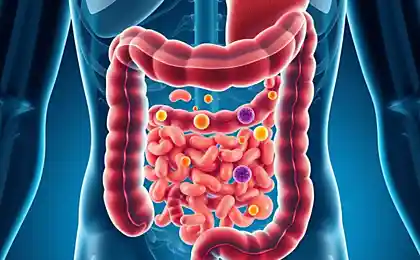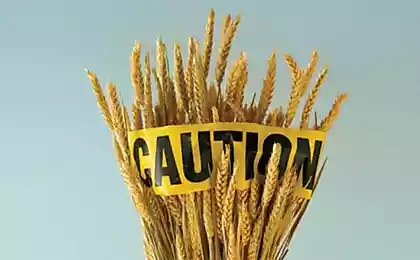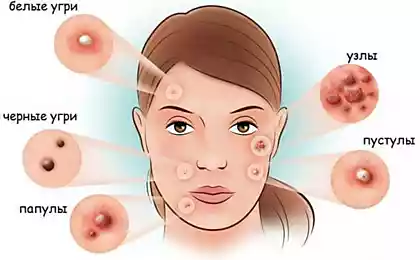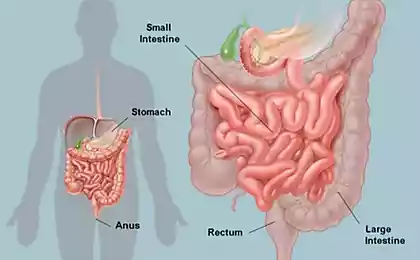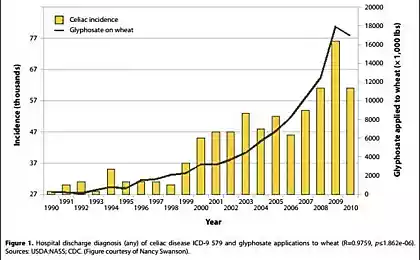522
How to determine whether you have sensitivity to gluten
Celiac disease, or simply the body's sensitivity to gluten, requires us to make adjustments in your diet. You must avoid foods containing gluten (gluten) to avoid various health problems.
Celiac disease is a disease associated with gluten intolerance. It is a widespread phenomenon, it suffers from every hundredth person on the planet. Although in some cases people have had similar symptoms and with a negative diagnosis.
With this in mind, experts in the field of health began to use the term "sensitivity to gluten without celiac disease" and, despite the fact that a universal analysis for its determination not exist, many would agree that as in the previous case, their condition can be kept under control through a gluten-free diet.

Many people with such disorders tend to take action as soon as possible, without consulting previously with a doctor. They prescribe a diet and stick to the diet without gluten.
However, it is better to be sure for sure as this type of power is quite complicated, if we talk about the long term, and preferably be under the supervision of a physician or licensed nutritionist that the diet was balanced and the body enough nutrients.
As in the case of other health problems, celiac disease or sensitivity to gluten without celiac disease, difficult to detect, especially when you don't know about all the symptoms. So our first weapon against disease is good awareness and skill to determine when the signals of our body are the cause for consultation with a specialist.
What are the symptoms, warning about the problems with gluten?
In 2009, the national Institute for health and clinical excellence (NICE English. abbreviation) issued a guidance entitled "Recognition and identification of celiac disease", developed by a team of gastroenterologists, nutritionists and immunologists (also the group included some patients).
It as the first steps to diagnosing disease, it is recommended to do a blood test, especially if the patient has a family history or one of the following health problems:
This analysis will also be needed if the patient has one or more of the following symptoms:
Any alternative methods of diagnosis should be avoided as celiac disease and sensitivity to gluten without celiac disease can lead to negative changes in health status that must be properly controlled, completely eliminating from your diet foods that contain gluten (gluten).
How to respond if you have a sensitivity to gluten?

If after you learned about the symptoms of this disease, you may notice that some of them appear often enough (or even become chronic), it is best not to try to find any other explanation as soon as possible to go to the doctor.
It is recommended to try to adhere to a gluten-free diet for 60 days, so to speak, to test empirically whether the decline in symptoms and can improve health.
If you are not able to completely eliminate gluten from your diet, it is a sign of dependence, to cope with which will help of an experienced nutritionist.
Cereals containing gluten are:

But those in which gluten no:
Most often it is:
And if you do have celiac disease or sensitivity to gluten, it is likely that the diet will work just fine. It is desirable to keep, to save yourself from more serious health problems and enjoy a high quality of life.
The effect of hormones on behavior: Testosterone promotes truthfulness and Oxytocin — deceit
Psychosomatic diseases of the pancreas
That is, if the doctors put such a diagnosis, you need constant effort to change habits, nutrition and lifestyle. Gluten should remain in the past and never to appear in your diet.published
Source: steptohealth.ru/kak-opredelit-est-li-u-vas-chuvstvitelnost-k-glyutenu/
Celiac disease is a disease associated with gluten intolerance. It is a widespread phenomenon, it suffers from every hundredth person on the planet. Although in some cases people have had similar symptoms and with a negative diagnosis.
With this in mind, experts in the field of health began to use the term "sensitivity to gluten without celiac disease" and, despite the fact that a universal analysis for its determination not exist, many would agree that as in the previous case, their condition can be kept under control through a gluten-free diet.

Many people with such disorders tend to take action as soon as possible, without consulting previously with a doctor. They prescribe a diet and stick to the diet without gluten.
However, it is better to be sure for sure as this type of power is quite complicated, if we talk about the long term, and preferably be under the supervision of a physician or licensed nutritionist that the diet was balanced and the body enough nutrients.
As in the case of other health problems, celiac disease or sensitivity to gluten without celiac disease, difficult to detect, especially when you don't know about all the symptoms. So our first weapon against disease is good awareness and skill to determine when the signals of our body are the cause for consultation with a specialist.
What are the symptoms, warning about the problems with gluten?
In 2009, the national Institute for health and clinical excellence (NICE English. abbreviation) issued a guidance entitled "Recognition and identification of celiac disease", developed by a team of gastroenterologists, nutritionists and immunologists (also the group included some patients).
It as the first steps to diagnosing disease, it is recommended to do a blood test, especially if the patient has a family history or one of the following health problems:
- Autoimmune thyroid disease;
- Dermatitis herpetiformis;
- Irritable bowel syndrome;
- The type 1 diabetes.
This analysis will also be needed if the patient has one or more of the following symptoms:
- Frequent cases of bloating and flatulence
- Irritable bowel syndrome or acid reflux
- Constipation or diarrhoea (chronic, recurring daily)
- The regular feeling of nausea and vomiting
- Delay in development or lack of growth (in children)
- Sudden and unexpected loss of body weight
- Headaches and migraines
- Joint pain
- Long-term (chronic) fatigue
- Depression or feeling increased anxiety
- Persistent eczema or acne (chronic)
- Anemia, iron deficiency or other type
Any alternative methods of diagnosis should be avoided as celiac disease and sensitivity to gluten without celiac disease can lead to negative changes in health status that must be properly controlled, completely eliminating from your diet foods that contain gluten (gluten).
How to respond if you have a sensitivity to gluten?

If after you learned about the symptoms of this disease, you may notice that some of them appear often enough (or even become chronic), it is best not to try to find any other explanation as soon as possible to go to the doctor.
It is recommended to try to adhere to a gluten-free diet for 60 days, so to speak, to test empirically whether the decline in symptoms and can improve health.
If you are not able to completely eliminate gluten from your diet, it is a sign of dependence, to cope with which will help of an experienced nutritionist.
Cereals containing gluten are:
- Wheat
- Rye
- Barley
- Oats
- Triticale
- Spelt (spelt)
- Kamut

But those in which gluten no:
- Quinoa
- Buckwheat
- Figure
- Sorghum
Most often it is:
- Semi-finished products
- Sauces and salad dressings
- Dishes with lots of ingredients
- Sweets and bakery products
- Food of fast preparation.
And if you do have celiac disease or sensitivity to gluten, it is likely that the diet will work just fine. It is desirable to keep, to save yourself from more serious health problems and enjoy a high quality of life.
The effect of hormones on behavior: Testosterone promotes truthfulness and Oxytocin — deceit
Psychosomatic diseases of the pancreas
That is, if the doctors put such a diagnosis, you need constant effort to change habits, nutrition and lifestyle. Gluten should remain in the past and never to appear in your diet.published
Source: steptohealth.ru/kak-opredelit-est-li-u-vas-chuvstvitelnost-k-glyutenu/



